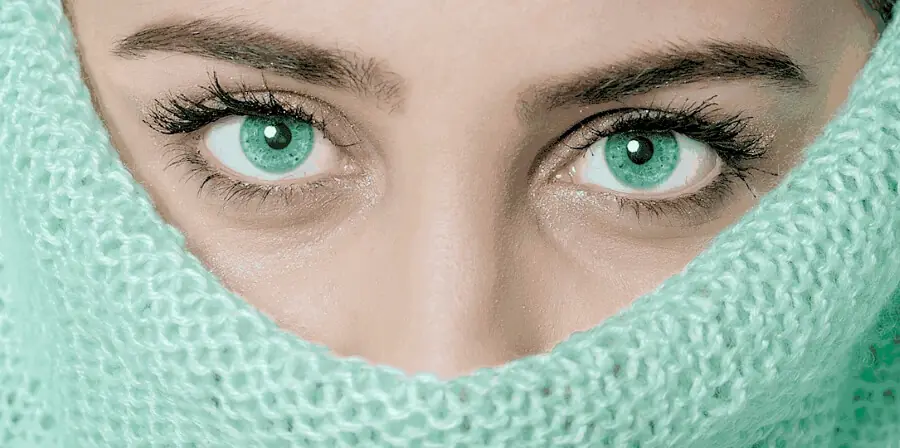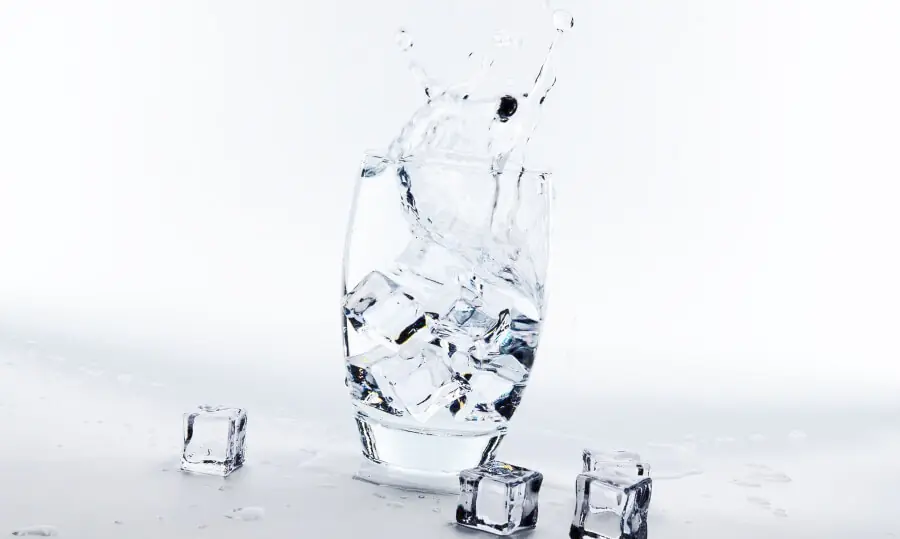
Content:
What is facial swelling
If your face swells in the morning, but it goes away after a short time, there is no serious cause for concern. This may be a result of pressure on your face while sleeping if you like to sleep with your face in your pillow. But if not, then first you need to understand the physiology of this unpleasant phenomenon.
Edema is an increase or stretching of tissue due to the accumulation of fluid or inflammation. It can occur anywhere on the face, but is most common on the lips, cheeks and eyelids, and can also spread to the neck area.
During sleep, fluid is redistributed. Usually most of it is concentrated in the lower half of the body, pulled down by gravity. But in a lying position, it is evenly distributed throughout the body, which is the most common cause of facial swelling in women in the morning. The effect disappears an hour after it occurs.
Orbiting astronauts have a perpetually swollen face due to the lack of gravity pulling fluids toward their legs while they are “hanging.” As a result, while in space, they lose most of the wrinkles on their faces.
Other physiological causes include:
- Water retention: The most common cause of this problem is fluid retention. The best way to avoid this is to limit your alcohol and salt (sodium) intake and, as counterintuitive as it may sound, drink more water (throughout the day) to flush your system.
- Allergic reactions. Another common cause of puffiness in the morning is an allergic reaction. Check for possible allergens, including allergies to the feathers in the pillow or the material of the pillowcase, by replacing them for a few days.
- Lotions and creams: It is also common for sensitive skin to react to lotions or creams applied to the face before bed. Stop using all products for a few days to see if the swelling goes away. Steroid creams are especially likely to cause swelling.
- Cushion height: Sometimes swelling is caused by the level of the pillow during sleep, which causes either pressure or water retention. Try to sleep with two pillows so that the fluid drains properly and does not settle in the head and neck area. If it hurts or causes discomfort, try an orthopedic pillow.

More about the reasons
Fortunately, the most common causes do not require specialized treatment and are our body’s reaction to certain factors, by eliminating which we will get rid of swelling. And in some cases, swelling goes away without any intervention. The most common of these reasons include:
Allergy
Dust, animal hair, plant pollen - all this endlessly swirls in the air and can lead to an allergic reaction. In addition to the usual sneezing and watery eyes, allergens can also lead to so-called facial allergies. Symptoms include puffy eyes, flaking skin, swelling and chapped lips from mouth breathing.
Sinusitis
Sinusitis is inflammation and swelling of the sinuses, which become blocked and filled with fluid during a cold. As a result, pressure develops in this area, accompanied by a dull ache around the eyes, greenish-yellow nasal discharge, severe headaches and swelling of the face.
Focus on rest, drink plenty of fluids and take an antihistamine and everything will go away on its own.
Abscessed tooth
An abscess (aka infection) causes pus to accumulate and become swollen around the tooth or gums. Accompanied by toothache and swelling of the face in the area of the diseased tooth.
At home, an abscess is treated with compresses and anti-inflammatory drugs. However, you should consider seeing a dentist as the abscess will need to be drained and oral antibiotics will also need to be taken.
Subsequent treatment will eliminate both the toothache and the swollen cheek.
Hot shower
There's nothing more relaxing than standing in a steamy shower. But too hot water is actually not that good, and after such a shower you may find that your face (and not only) has increased in size. Hot water steams and relaxes the skin and muscles.
Too much drinking
We all know that drinking too much alcohol dehydrates the body, which is what makes hangovers so bad. But dehydration in turn leads to fluid retention, and the next morning you will wake up not only with a sore head, but also with a swollen face.

Too much salty
If you spend the evening lying in bed with a large bag of chips, you may wake up the next morning with severe swelling. Excessive salt content can cause the body to retain more fluid in an attempt to dilute the salt, causing the face to appear more puffy than usual.
PMS (premenstrual syndrome) sometimes causes fluid retention in the body, which, as we know, can also lead to swelling.
Allergy to pillows
Blankets and pillows are another cause of morning swelling. Feather pillows or a duvet can be a real allergen, especially for women. Agree, it’s not pleasant to wake up in the morning with a swollen face, even if you really love your bedding.
Sunburn
Yes, it is possible to get a sunburn even if you don't feel it. And this can cause not only redness, but also swelling in some cases. For this reason, it is necessary to use sunscreen daily.
Barley
This is a painful inflammation on the edge of the eyelid. It can be external or internal, and can often cause swelling of the area around the eyes. You can treat the sore spot with chloromycetin, but after a maximum of 7 days it will break through and the swelling will go away.
Reactions to medications
Facial swelling may occur as an allergic reaction to certain medications, such as penicillin or aspirin. If you suspect an allergic reaction, you should consult your doctor as soon as possible about allergy injections or oral antihistamines.
If your face swells and does not go away
But why does the face swell and the swelling does not subside? If the swollen face continues to increase and causes severe pain, or if it is accompanied by other symptoms, you should see a doctor immediately, as it may be a symptom of a more serious condition:
Angioedema
Angioedema is an excessive accumulation of body fluids in the skin, caused in many cases by an allergic reaction. As a rule, it occurs together with urticaria. The most common locations are the area around the eyes, lips and face, but it can also appear in other parts of the body, and even in the throat. In particularly difficult cases, immediate treatment with adrenaline is required.
Angioedema can be caused by an allergic reaction to:
Dermatomyositis
Dermatomyositis is an autoimmune disease in which the skin and skeletal muscles are infiltrated predominantly by lymphocytes. Although it is an idiopathic disease, it may result from an interaction between the patient's genetic background (determining the immune system response) and the viral pathogen. One of the symptoms is bilateral facial swelling.
Malnutrition (severe) or obesity
In both cases, facial swelling is a disruption of body functions.
Skin infections
A bacterial skin infection causes the face or other area of the body to swell and become inflamed, red, and hot to the touch. If you experience these symptoms—and especially if the swelling spreads—go to the emergency room. With timely treatment, only a week's course of antibiotics is needed, but without treatment, deaths are common.

Piggy
Other symptoms in addition to a puffy scalp include headache, fever, and muscle pain. Most cases resolve within a few weeks as the illness subsides.
Thyroid
The thyroid gland produces a hormone that regulates metabolism and body temperature. If for some reason not enough hormones are produced, metabolic changes can lead to enlargement of the subcutaneous tissue.
Symptoms that accompany this condition include increased feeling of cold, weakness, dry skin and irregular menstruation.
Conjunctivitis
If the swelling is concentrated around the eye area, it's likely conjunctivitis, a nasty infection or inflammation of the membrane lining the eyelids.
Most causes of conjunctivitis are related to viruses, but there are also cases of allergies. In addition, there are also bacterial conjunctivitis or even caused by contact lenses. In addition to swelling, there may be redness, watery eyes, or itching. Viral conjunctivitis is usually treated with supportive care, which includes cool compresses. Bacterial conjunctivitis requires antibiotic eye drops.
Rosacea
If you have rosacea, certain triggers can cause a flare-up. Hot weather, spicy foods, alcohol and even emotional stress can lead to facial flushing, burning and even swelling.
A gentle cleanser and moisturizer and daily use of sunscreen will help control symptoms.
Are you taking steroids?
A puffy face may be the result of taking prescribed steroids—and higher doses may lead to more significant side effects. In this case, you should discuss with your doctor the possibility of reducing the dose.
Cushing's syndrome
Yes, cortisol is a stress hormone, but it also helps regulate blood pressure, blood sugar and a variety of other processes. But when too much of it is pumped out by the adrenal glands, it can lead to Cushing's syndrome, a disease characterized by a round, puffy face, easily vulnerable skin, and increased body hair.
Cushing's disease affects women nearly three times more often than men and often occurs in people who have been treated with glucocorticoids.
If left untreated, Cushing's syndrome can lead to heart attack, stroke, and type 2 diabetes.
Lung cancer causes swelling of the face and neck when the cancer presses on a vein that runs from the head to the heart. This symptom is called superior vena cava syndrome or superior vena cava obstruction.
The superior vena cava is a vein that carries blood from the head and arms to the heart and runs near the top of the right lung and the lymph nodes in the chest cavity. Tumors in or around the lungs or lymph nodes can block normal blood flow, leading to obstruction.
Besides lung cancer, other cancers that lead to superior vena cava obstruction include:
- mammary cancer,
- lymphoma,
- thyroid cancer,
- thymus tumor.
This condition can also be caused by other non-cancerous diseases:
- tuberculosis,
- inflammation of the vein (thrombophlebitis),
- fungal infection such as histoplasmosis,
- aortic aneurysm (swelling of the main artery that carries blood from the heart to the body),
- blood clots in the superior vena cava,
- enlargement of the thyroid gland,
- constrictive pericarditis (inflammation of the membrane surrounding the heart),
- side effect of radiation therapy in the chest cavity.
Symptoms of superior vena cava obstruction may develop quickly or gradually. Early symptoms include swelling around the eyes or face, especially in the morning. Common symptoms of superior vena cava obstruction include shortness of breath and swelling of the face, neck, arms, or torso. Sometimes, superior vena cava obstruction can also cause dizziness, visual disturbances, fainting, and redness of the face, palms, or mucous membranes. The condition requires immediate medical attention.

What to do
What to do? If swelling is not a symptom of the disease and, as a rule, goes away after half an hour, you can start following simple rules that will give excellent results in a very short time:
- The idea that drinking water can lead to a bloated face is a myth. In fact, everything is exactly the opposite - insufficient water consumption can lead to swelling of the face. Dehydration causes blood vessels to dilate, which in turn promotes water retention, especially in the facial area.
High salt content in the body retains water, which also causes swelling. Avoid carbonated drinks and always monitor the salt levels in your food.
Never underestimate the power of a good massage to help de-puff your face. Lubricate your face with moisturizing or massage oil and massage lightly. This process will help push excess fluid to the lymph nodes in the neck.
The first and main rule is not to drink anything after 9 pm. If you feel very thirsty, suck on ice or take a couple of sips of kefir. The fact is that the liquid you drink before going to bed manifests itself in the form of swelling on the face in the morning.
Moisturizing face masks bring tangible benefits to health and appearance, leaving the skin soft and velvety. But never make such masks at night. Excessive skin hydration can cause swelling.
Do swelling on your face appear every morning? Take diuretics. If you choose store-bought ones, first consult your doctor, as these drugs have contraindications. But you can use natural products that remove fluid from the body well. These include: watermelons, green tea, cucumbers. These products will not only rid you of excess fluid in the body, but will also cleanse it of toxins and waste.
Pay attention to the patches - overlays for the area under the eyes, soaked in special useful products. Choose a decongestant option. Such devices have a lymphatic drainage effect and can relieve you of swelling for a long time.
Stop drinking coffee or reduce the amount you drink to a minimum. The fact is that this invigorating and, for many, tasty drink removes a special fluid from the body, which maintains the normal balance of moisture in the body. Replace coffee with green tea; this drink is also unusually aromatic and has a unique pleasant taste. And, of course, never drink coffee before bed.
To always look charming, drink as much water as your body requires. You don’t need to endure thirst, but you shouldn’t pour excess liquid into yourself either. Listen to the desires of your body, take care of your health, eat natural and healthy foods, and your beauty will be perfect.
Prevention
Despite the fact that the causes of swelling are different and the methods for treating them are also different, preventive measures in many cases are the same:
- Physical activity helps to “squeeze” excess fluid out of the body.
- Include healthy “anti-edematous” foods in your diet: apples, cottage cheese, tea with lemon; In case of food allergies, you need to follow a diet.
- Limit your salt intake.
- To avoid facial swelling, it is recommended to sleep on your back: sleeping on your stomach often leads to baggy lower eyelids.
The opinion that morning swelling on the face is caused only by kidney or heart disease, or regular nighttime gatherings and an unhealthy lifestyle is wrong. Having understood the accompanying symptoms and the frequency of swelling, you can find more than a dozen causes of the pathological condition.
The main causes of swelling in women
Mild or severe swelling on a woman’s face can appear in different areas. Thus, swelling that forms in the morning in the area of the eyes and cheeks is most noticeable.
Some types of swelling cover the entire face and are so severe that they can frighten a woman. The reasons why women's faces swell in the morning are divided into two groups. The first is related to the characteristics of physiological processes and lifestyle, and does not include serious diseases:
- tearfulness before bed - crying because of a quarrel, a sad movie or a sad mood;
- a strict diet with limited proteins and vitamins - blood vessels suffer, which increases swelling;
- a large evening meal with fatty and salty dishes - overeating often leads to slight swelling;
- allergic reaction to food or cosmetics - may be accompanied by rash and itching, uneven swelling;
- evening drinking - due to alcohol, the face can swell very much in the morning, abuse leads to chronic swelling;
- smoking is a specific factor of pathology, but it does not occur in all women;
- too salty food - too much salt in the diet leads to swelling of the entire body, including the face, legs and arms;
- bruises and other facial injuries - pathology can appear with a slight blow (carelessness, fall);
- in the evening an excessive amount of liquid (not alcohol) was taken;
- blood transfusion.
In women, swelling of the face can be observed not only in the morning, but also during the day, if we are talking about pregnancy. Another specific condition is 1-2 days before the onset of menstruation, as well as the first 2-3 days after their arrival.
Pregnancy, menstruation and swelling
Natural fluctuations in hormonal levels during pregnancy can lead to temporary fluid retention. However, swelling in this case will not look too scary. For most people around, it may be invisible.
If during pregnancy your face is always swollen and your legs are very swollen, this may be a consequence of poor kidney function.
Severe swelling requires medical intervention. Sometimes homeopathic diuretics and other medications are prescribed as part of decongestant therapy.
Causes of edema associated with diseases
If swelling forms very quickly, is localized on the left or right side, and is also accompanied by redness and other unpleasant symptoms, then pathological processes are almost always diagnosed.
The most common diseases that lead to an unpleasant condition:
- osteochondrosis of the upper spine and neck;
- decreased immunity or other disorders;
- insect bites (sometimes swelling can spread to the entire side of the face on which the bite is located);
- parasitic infections - roundworms, pinworms;
- diseases of the heart and blood vessels, including hypertension;
- kidney and liver problems;
- pathological hormonal disorders.
Most diseases are accompanied by additional symptoms. If you notice some of them, you should think about undergoing tests and diagnosing an organ that is not working correctly.
| Type of edema | Other symptoms | Possible reason |
| The face becomes puffy, the legs almost always swell | Difficulty breathing, changes in liver size, skin becomes bluish | Heart disease, high blood pressure |
| Local facial swelling | Clear limits, swelling on one side | Neoplasms in tissues |
| Swollen eyelids, varying degrees of swelling, swollen lips | Rash, increased cough, sometimes choking | Allergy, Quincke's edema |
| Swelling in the nose area | Runny nose, stuffiness | Inflammation, chronic respiratory tract diseases |
| Severe bags under the eyes, as if filled with water, disappear during the day; if you press with your finger, it leaves a dent | Yellowing of the skin, rapid weight gain as organs swell | Kidney problems |
| Swollen fiber under the skin, dense swollen tissues, no dent after pressing | Disruptions occur in the cycle, weight increases, skin and hair health deteriorates | Hypofunction of the thyroid gland, severe hormonal imbalances |
| Swelling during pregnancy, affecting the legs and face, when pressed with a finger, a spot remains for a while | Gaining kilograms, blood pressure, protein in urine tests | Preeclampsia, preeclampsia |
If the swelling is accompanied by a group of the described symptoms, then to eliminate it you need to consult a doctor for diagnosis. In emergency situations, such as with Quincke's edema, emergency medical care is needed.
Ways to eliminate swelling at home
You can effectively relieve swelling at home using several methods. But it should be borne in mind that they are effective only for eliminating pathology caused by lack of sleep, tears, alcohol, but not diseases:
- A contrast shower followed by a compress with a cold towel (10 minutes) helps;
- you can apply an ice cube wrapped in cloth to your face, but not to your eyes (or use a bag of frozen vegetables);
- Sometimes prolonged exposure to cold water helps (direct a shower with ice water on your face);
If the swelling does not go away, but you absolutely must get rid of it, use diuretics. However, their regular use is unacceptable.
Drugs to eliminate swelling
Diuretics can be medicinal or homeopathic. The most effective natural product is a decoction of bear's ear herb. Simply brew it according to the instructions and take it orally. By following the treatment regimen, you can get rid of swelling in a few days.
If the swelling is associated with allergies or bruises, then the use of homeopathic preparations will not work.
Among the medications that best help relieve swelling after sleep caused by disease or pathology are: Canephron, Phytolysin, Eufillin (contraindicated in heart disease), Furosemide.
These tablets are made from natural ingredients and are often used in complex therapy of kidney diseases.
To treat morning swelling, ointments that have a local effect are used. An excellent choice would be Dolobene gel or Troxevasin.
You can get rid of an allergic reaction that occurs in the form of swelling only after using antihistamines (Suprastin, Tavegil).
Anti-edema masks
You can treat a swollen face with natural masks. They help both as part of complex therapy and as an independent remedy:
- Potato. Use a raw vegetable, grated. You need to keep it on your face for 15 minutes.
An ice cube will help enhance the results. In emergency situations, you can remove swelling with regular frozen water, but ideally you should keep cubes of herbal decoction in the freezer: chamomile, oak bark, sage, mint, lemon balm.
The best compress for swelling
Regular black tea will quickly relieve puffiness after sleep. Brew 3 sachets in a glass of boiling water, then soak gauze or bandage in the resulting broth and apply it to your face. You can keep the gauze for 10-15 minutes, and wash your face after tea with cool water.
If black tea is not available, use unflavored green tea.
Green tea should be brewed for about 10 minutes, just fill it not with boiling water, but with water up to 80 degrees Celsius. Green tea contains more vitamins and antioxidants. In some cases it works better than the black counterpart.
To minimize swelling after sleep, do not eat 3-4 sleeps before a night's rest, consume less salt, and stick to proper nutrition. If swelling bothers you for several weeks in a row, consider getting diagnosed.
If after waking up you often see puffiness under your eyes in the mirror, it’s time to check your health and find out why they appear. The reasons may be different, including purely female ones. Let's figure it out.
- Why does the face swell?
- External causes of facial swelling after sleep
- Physiological causes of edema in women
- Swelling of the face due to illness
- How to quickly relieve facial swelling at home
- Cosmetic procedures against puffiness in the morning
- Tips and tricks for preventing edema
Why does the face swell?
Edema is the retention of fluid in body tissues. On the face, it usually stagnates in loose subcutaneous fat under the eyes, in the cheekbones and under the chin, so swelling most often forms in these areas.
External causes of facial swelling after sleep
Often we ourselves, voluntarily or unwittingly, provoke fluid retention, and in the morning we are surprised to notice that our face is swollen.
Shedding a tear over a good movie or book is not a problem. But if grief happens in life, then tears can become a constant companion. They lighten the soul, but they don’t have the best effect on the face. When we cry often and for a long time, the tear glands become inflamed from overactivity and the eyes look swollen. The drainage function of tissues is impaired.
Tears wash the soul, but don’t have the best effect on the face. © Getty Images
Drink plenty of fluids
This is the most obvious. If you try to maintain a drinking regime, this is good, but it is important to meet the standards not only in terms of water volume (30 ml per 1 kg of weight), but also in time. After 19.00, it is recommended to reduce fluid intake to a minimum. The kidneys are less active in the evening and at night, hence fluid retention.
Insufficient water consumption
Any extremes are not good. When there is a shortage of water, the body begins to retain it. And as a result, dehydration is paradoxically combined with edema.
Salty food
Just 1 gram of salt retains as much as 100 milliliters of water, which is why you’re so thirsty after eating herring and chips. If you eat salty foods before bed, all these milliliters will be noticeable on your face. Keep in mind that fast food often contains too much salt.
Appetizing and low in calories, but can lead to swelling - moderation is important in everything. © Getty Images
Ekaterina Turubara, medical expert of the Vichy brand: “Salty and pickled dishes retain moisture in the skin and subcutaneous fat, which leads to swelling.”
Sweets
Alcohol
Especially in uncontrolled quantities and at night. Alcohol not only rewards us with extra and completely useless calories, but also dehydrates the tissues, which causes fluid stagnation.
Low Protein Diet
Protein is directly involved in metabolic processes and the return of fluid from tissues to the bloodstream. With strict diets or a frivolous approach to vegetarianism, swelling may develop.
Physical inactivity
A serious lack of physical activity prevents the heart from working properly and causes congestion.
This is what a good morning looks like - if healthy, moderate and enjoyable physical activity becomes a habit, you can most likely forget about swelling. © Getty Images
Eye strain
Many hours at the computer, working in front of a glowing screen in a dark room - all this can cause swelling in the eyelid area.
High stress levels
The release of stress hormones, especially if multiplied by a lack of physical activity, also leads to fluid retention. This is why we don't look our best after a hard week at work.
At least once a week, you need to rest with a mask on your face. Happy Weekends! © Getty Images
Incorrect body position during sleep
Sleeping with your face in a pillow and in general in any uncomfortable position leads to fluid stagnation, swelling and unpleasant sensations after waking up.
Illiterate care before bedtime
“If you use the product right before bed, there is a risk of swelling the next morning, especially if the formula contains ingredients that can attract water. When we stand, most of our internal fluids accumulate in the lower part of the body due to gravity. As soon as the body assumes a horizontal position, the liquid is redistributed evenly. The cream works honestly, “attracts” water as much as it can. As a result, not only the epidermis is moisturized, but also all underlying tissues.”
For beauty, it is generally useful to go to bed early, but the evening beauty ritual should end at least an hour before bedtime. © Skin.ru
Physiological causes of edema in women
Morning swelling is not always caused by external circumstances; it can be caused by:
Purely female physiological reasons are associated with changes in hormonal levels, or more precisely with the activation of progesterone. It is this hormone that begins to inhibit all processes, including the removal of fluid. Its goal is to maintain the pregnancy. And even if it does not occur, after ovulation progesterone plays a leading role.
Swelling is not obligatory, but quite a frequent accompaniment of pregnancy, it all depends on individual characteristics. © Getty Images
With age, the synthesis and activity of estrogen also decreases, which in a certain sense oppose progesterone, so it can “bend its line.” In this regard, not only the face swells, but also the legs, which are under constant stress, as well as the hands.
Swelling of the face due to illness
If your face swells in the morning for no objective reason, then it’s time to go to the doctor. First, go to a therapist, he will help you decide on further actions. Swelling of the face in the morning in women, and in men too, can be associated with very serious ailments.
Diseases heart and blood vessels. Fluid retention sometimes indicates developing heart failure and hypertension.
Problems with kidneys - the main organ that removes fluid. Kidney diseases are characterized by morning swelling of the face and neck, which can gradually spread to the entire body.
Allergy. Swelling and redness are often its first manifestation. If symptoms worsen, emergency treatment may be required.
Inflammatory process - as with allergies, the accumulation of histamines causes swelling.
Serious problems in digestive system - in particular, impaired protein absorption.
In general, if your face swells every morning, it’s time to take care of your health.
How to quickly relieve facial swelling at home
It is clear that you can get rid of morning facial swelling using home methods only if the swelling is caused by external causes.
Procedures
Cold and hot shower. In our case, this means alternately washing with cold and warm water. Very refreshing and toning, reduces swelling.
Ice. It makes sense to keep a bag of ice cubes in the freezer. You can also make ice from herbal infusions and wipe your skin with it if necessary.
Ice cubes are the main remedy for quickly getting rid of swelling. © Getty Images
Massage. An effective method for eliminating edema by improving microcirculation and lymph flow. The procedure with a massage jade roller is very pleasant.
Masks
Parsley mask with sour cream
Ingredients:
3-4 sprigs of parsley (it also works as a diuretic when taken orally);
How to cook:
finely chop the parsley;
Mash it with a mortar until it becomes a paste;
mix with sour cream.
How to use:
wash with cool water, pat skin with a towel;
apply the mask to swollen areas, including the area under the eyes, and leave for 15-20 minutes;
rinse with cool water and wipe skin with tonic.
Potato mask for puffiness
Ingredients:
1 tsp. buckwheat flour (can be replaced with rice or wheat).
How to cook:
peel potatoes;
grate it on a fine grater;
mix all ingredients until smooth.
How to use:
wash with cool water;
apply the mask to swollen areas, including the area under the eyes;
leave for 15-20 minutes;
rinse with cool water and wipe skin with tonic.
Compresses
Peppermint compress
Ingredients
A few sprigs of fresh mint.
How to cook:
rinse the mint in clean water;
Lightly beat them so that the juice and essential oils come out.
How to use:
put cooled mint leaves on swollen areas;
leave for 10 minutes;
remove leaves, wipe skin with tonic.
Important: we strictly do not recommend applying a mint compress to the skin around the eyes.
Tea compress
Ingredients:
1 tbsp. l. dry green tea leaves.
How to cook:
brew the leaves in two tablespoons of hot water (80 ºC);
Cool completely and place in the refrigerator for 15 minutes.
How to use:
apply cold tea leaves to swollen areas of the face;
leave for 10 minutes;
remove the leaves and wipe the skin with tonic.
Review of remedies against morning swelling
haloxyl, grapefruit extract, caffeine, mineral pigments
The formula combats under-eye bags with a cool roller applicator for a cooling effect.
protensil, soy peptides, LHA, vitamin B3
The tightening complex promotes natural restoration of skin elasticity, makes it denser, smoothes facial contours.
resveratrol, baicalin, bifidobacteria extract, caffeine, adenosine
Tones the skin, improves microcirculation and provides a drainage effect.
Ekaterina Turubara explains: “Manufacturers pay special attention to night care for the skin around the eyes - ingredients known for drainage properties are included in the products.”
Cosmetic procedures against puffiness in the morning
If swelling is not associated with underlying causes - serious health problems, then it can be reduced with the help of cosmetic procedures that improve local blood circulation and lymphatic drainage. What methods should I pay attention to?
Decongestant massage - it is better to have it done by a cosmetologist who specializes in manual massage.
Darsonvalization - its effect is based on the action of microcurrents.
Myolifting activates microcirculation and lymphatic drainage in the skin through electrical impulses, and also provides a tightening effect.
Ozone therapy is another way to enhance lymphatic drainage and get rid of congestion.
Tips and tricks for preventing edema
To protect yourself as much as possible from unpleasant morning discoveries, you should follow a healthy lifestyle:
eat right - include enough protein in your diet, control the amount of salt and sugar;
do not abuse alcohol;
get enough sleep - and sleep correctly;
drink enough water at the rate of 30 ml per kilogram of weight;



